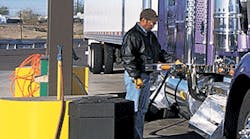Hurricane damage to the energy infrastructure has caused fuel shortages, mostly in the Gulf Coast region, that are impacting leading truckstop operators, which are reporting that tight supplies at some facilities are requiring them to take special measures.
As of today, Flying J has reported low fuel supplies at the following truckstops:
- St. Augustine, FL
- Brunswick, GA
- Carnesville, GA
- Resaca, GA
- Kansas City, MO
- Peculiar, MO
- Sullivan, MO
- Pearl, MS
TravelCenters of America (TA) yesterday said a 50-gallon maximum diesel purchase policy, with a 25-gallon limit for reefers, remains in effect at some of its truckstops in Florida, Georgia, Louisiana, Mississippi, Nevada and Tennessee. Its Catersville, GA, stop, which is just outside Atlanta, was out of fuel, but is scheduled to be resupplied today, a TA spokesperson told FleetOwner.
For specific TA truckstop location details, go to www.tatravelcenters.com.
“At truckstops where we allocate fuel we put a maximum limit on purchases,” Tom Liutkus, TA director of advertising & public relations told FleetOwner. “For example, if it takes 110 gallons to fill-up 18-wheelers, a 50-gallon diesel allocation is a small way to keep commerce moving for twice the number of customers. If half the trucks pull all the product, that means the other half of the trucks will be out of fuel.
“Allocations are only done on crisis situations,” Liutkus added. “This is the most widespread crisis of this kind that we’ve seen. We’re trying to manage this so it’s fair as possible for everybody.”
After Hurricane Katrina, Flying J announced it would implement a frequent-buyer program that ensures that a customer who purchases 2,000 gallons or more of Flying J fuel per month won’t have to limit fuel purchases while others will be allocated fuel during a crisis.
“In this program, someone who has purchased no fuel, will receive no allocation,” Flying J stated in a news release. “The system will calculate allocations for cash customers via the frequent fueler account and credit customer allocations will be determined through the applicable billing company on a per card basis.”
The Atlanta Journal-Constitution today reported that diesel remains tight in Atlanta despite a two-day shutdown of schools meant to save fuel. But despite recent reports of filling stations running out of fuel in the area, transportation operations are functioning.
“We do not have any locations where we have had vehicles idle for want of fuel,” Susan Rosenberg, UPS spokesperson told FleetOwner. “We are operating everywhere but it has been a challenge as we continue to shift where sources of supplies are stronger and work with different pipeline and supplier groups for our needs. It is a situation we continue to monitor. Right now, including in Georgia, we have not experienced issues of having no fuel available.”
Refinery outages along the Gulf Coast as well as the Colonial Pipeline, a major fuel artery that supplies the South East region, operating at 55% capacity (due to electricity issues) account for the supply problems. Colonial Pipeline said it expects to reach full operating capacity later this week, while it could take weeks to months to get some refineries back online.
“Virtually the entire Southeast of the U.S. is supplied by Colonial,” TA’s Liutkus said. “Every refiner in the gulf pumps fuel into that pipeline and there’s dozens of terminals in that area. If those areas are pinched you’re going to see various outages and allocation [issues] along that corridor.”




